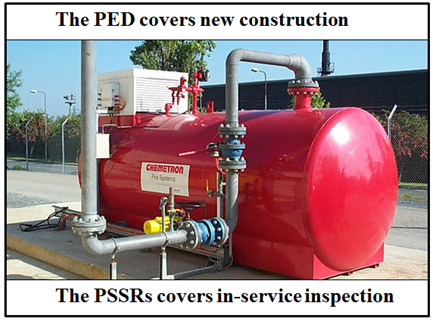PRESSURE SYSTEM REGULATIONS
These are country-specific and vary a lot around the world from countries that have a very rigid well-defined system of regulation to those that have no regulations at all. The two main bits of legislation covering Pressure Systems in the UK are the Pressure System Safety Regulations (PSSRs) and the European Pressure Equipment Directive (PED)
What do the PSSRs and PED cover?
They have completely different scopes;
- The PED covers new manufacture of pressure equipment and is EU-wide
- The PSSRs cover in-service use of pressure equipment and is law in Great Britain only

The PSSRs
The Pressure Systems Safety Regulations (PSSRs): 2000 are formally registered as Statutory Instrument No 128 (SI 128) and, as such, are law in the United Kingdom (UK). They came into force on 21st February 2000.
The Approved Code of Practice (ACoP) for the PSSRs is a 69-page published booklet referenced as ACoP L122 (ISBN 978-0-7176-6644) downloadable from the HSE website www.hse.gov.uk/pubns/priced/l122.pdf
The PSSRs comprise a number of different regulations and prescribe the role of the Competent Person involved in the inspection activities; see the fig below;
The European PED
The PED prescribes a set of controls on the design; manufacture and testing of new pressure equipment. It is implemented into UK law by the Pressure Equipment Regulations (basically the same wording as the PED with the title changed).
You can see details on the HSE website www.hse.gov.uk/pressure-systems/law.htm and the EU site https://ec.europa.eu/growth/sectors/pressure-gas/pressure-equipment/directive_en

The purpose of the PED is to provide for a legal structure whereby pressure equipment can be manufactured and sold throughout the EU without having to go through a local design approval and inspection regime in every member state. The objective is also to ensure common standards of safety in all pressure equipment sold within the EU i.e. manufacturers are able to meet the requirements for approval in any member state of the EU, and do not have to repeat the process when selling goods in any other state.
The PED divides pressure equipment into risk categories, based on the hazard presented by stored energy (pressure-volume product) and the nature of the contained fluid. Assessment and conformity procedures are different for each category, ranging from self-certification by manufacturers for the lowest category up to involvement of a formally accredited Notified Body (NoBo) for more dangerous categories.
The European PED prescribes a set of controls on the design; manufacture and testing of new pressure equipment. It is implemented into UK law by the Pressure Equipment Regulations (basically the same wording as the PED with the title changed).
Enforcement of regulations
For some guidelines on how Authorities such as the HSE go about enforcing pressure system legislation, have a look at our article:HSE enforcement:Forseeability and Benchmarks
Can we help you further?
Yes, if you have any particular questions on pressure equipment regulations or codes then contact us on our email or telephone service. We are not part of any government body, association, institution, agency or employer. Nor do we officially represent any of them, so you can be assured that we can provide you with an objective viewpoint.
Matthews Integrity Hub: HEAD OFFICE is OPEN EVERY DAY….0730 – 2200 Monday – Sunday…That’s correct, all week, every week, including holidays
 If we happen to miss your call, leave a message and we will call you back just as soon as we pick it up. Sorry, there’s no automated messages, call queueing, voice recognition tools or canned music. Try it and see.
If we happen to miss your call, leave a message and we will call you back just as soon as we pick it up. Sorry, there’s no automated messages, call queueing, voice recognition tools or canned music. Try it and see.
CONTACT US
Tel: 07746 771592 help@matthewsintegrity.co.uk





